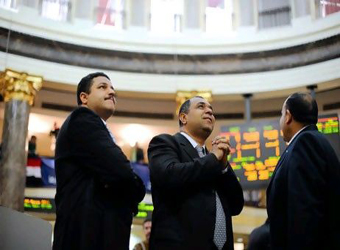Egypt’s bourse closed higher on Wednesday with gains totaled 5 billion pounds powered by foreign net buyers. The country’s main bourse index climbed to cross the level of 7840 to meet expectations made by Beltone Financial that the rally will continue towards 7900-8000 points.
“ Egypt’s benchmark index EGX30 crossed the resistance levels of 7640 and 7700, and thus is expected to continue the rally towards 7900-8000 points.”
“Traders are advised to buy now and add to their portfolios,” said Mohab Ageena, head of technical analysis, Beltone, “The 7500 level will be the stop-loss point.”
The Egyptian Exchange (EGX) indices were wavering in green notes on Wednesday afternoon.
Commenting on EGX30’s significant rally, the Financial Times issued a report on Tuesday saying: “Who says military rule is bad for stock markets? The EGX30, Egypt’s main stock index, is now over 7,700 – a level not seen since mid-2008.”
“The index has surpassed the previous post-Lehman high before the removal of president Mubarak, which was just over 7,600 in April 2010.” The report said
“The pre-Lehman peak of nearly 11,000 is still some way off. And the last time the index was at this level, it was on the way down, not up, of course. But it’s still another milestone.”
Indices
Egypt’s benchmark index EGX30 ended 1.55 per cent higher to 7840.68 pts; while EGX20 finished 1 per cent up to 9223.37 pts.
Meanwhile, the mid- and small-cap index, the EGX70 increased by 0.50% to close at 658.03 pts. The price index EGX100 hiked by 0.63 per cent to conclude at 1121.81 pts.

Turnovers Crossing One Billion Pounds
Through the closing session of Wednesday, the trading volume has reached 297.795 million securities, with turnovers worth EGP 1.167 billion, exchanged through 44.396 thousand transactions.
Also during the closing session, 186 listed securities have been traded in; 87 declined, 83 advanced; while 16 keeping their previous levels.
Investors’ Activities
The foreign and Arab investors were net buyers on Wednesday seizing 7.14% and 6.49% respectively of the total markets, with a net equity of EGP 17.474 million and 69.639 million respectively, excluding the deals.
On the contrary, Egyptian investors were net sellers capturing 86.37% of the total market, with a net equity of EGP 87.114 million, excluding the deals.
Companies’ Activities
At the EGX30, Cairo-based investment bank EFG-Hermes Holding (HRHO.CA) saw its share price rise by 0.26 percent to EGP 11.36.
Market bellwether Commercial International Bank S.A.E. (COMI.CA) jumped 3.66 percent to EGP 36.80.
In the real estate sector, Palm Hills Development Company (PHDC.CA) inched higher by 0.31 percent to trade at EGP 3.22, Talaat Moustafa Group Holding (TMGH.CA) climbed by 1.23 percent to trade at EGP 7.40, and Sixth of October Development and Investment Co S.A.E – SODIC (OCDI.CA) surged 1.81 percent to close at EGP 24.75.
The FT Report – Index Back to 2008 Levels
The UK Financial Times further referred the strange thing is that Egypt isn’t exactly in great shape. General Sisi, who is likely to run for president in elections later this year, is something of an unknown quantity. And although the violence and unrest has calmed down, the deadly attack on a bus carrying tourists last weekend was a reminder that it is not that far away.
Rating agency Fitch may have put the country on a “stable” footing in its recent sovereign review, but the economy is still sluggish, it noted. Growth remains far below the rates needed to bring the unemployment rate down. Capital Economics pointed out in a note on Tuesday that GDP of around 4.5 per cent is needed to reduce the jobless rate, whereas current growth is around 2 per cent.
But still the market rises, up 70 per cent since the coup that removed Mohamed Morsi in 2013.
The question is, who is driving the rally? Up until now, it has been mainly local investors, who are encouraged by the relative political stability, as well as the financial support from the Gulf.
Simon Kitchen, strategist at EFG-Hermes, the Cairo-based regional investment bank, says that the billions from the Gulf states has pushed interest rates on the Egyptian pound lower, so some money is switching from local government treasury bills to equities. “Financial support has smoothed over some of the worries,” he says.
However, Kitchen suggests that the new-found confidence in local portfolio managers has yet to catch on with foreign investors. “They are comfortable with [the idea of] a cyclical recovery, but there is still the problem of repatriating foreign currency.”
And the de facto capital controls also act as another spur to Egyptian investors to put money into equities, as it is hard for locals to get foreign currency.
So will the rally continue? Without any major upheaval or political shocks, local investors could push prices up further.
But as Kitchen says: “for a sustained rally, you need to see foreign money come in. We are not seeing that right now.”
